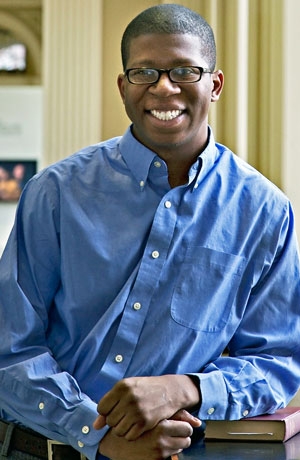
David J. Knight ’10, of Slidell, La., has won the inaugural Woodrow Wilson-Rockefeller Brothers Fund Fellowship for Aspiring Teachers of Color. The teaching fellowship provides Knight a $30,000 stipend to complete a master’s degree in education in preparation to teach in a high-need public school, support and mentoring throughout a three-year teaching commitment, and guidance toward a teaching certification. He is one of 25 students across the country to win the competitive fellowship. “I feel honored to have received the Woodrow Wilson-Rockefeller Brothers Fund Fellowship,” said Knight, a history major with a concentration in political history. “The process was highly selective and I was glad the committee chose to offer me this opportunity. It’s very affirming to receive this kind of support for my choice to enter the field of education.” Established in 1992 by the Rockefeller Brothers Fund (RBF), the Fellowships for Aspiring Teachers of Color were created to help recruit, support, and retain individuals of color as public education teachers and administrators. Since the program’s inception, it has awarded nearly $8 million in grants and financial assistance to 350 fellows. In January 2009, RBF transferred the program to the Woodrow Wilson Foundation. Knight is in the first class of new recipients for the award. According to the organization’s website, current trends indicate that by the year 2020, the percentage of teachers of color will fall to an all-time low of five percent of the total teacher force, while the percentage of students of color in the K-12 system will likely be near 50 percent. The fellowship offers an opportunity to ensure that greater numbers of highly qualified teachers of color enter public school classrooms around the country. Knight said in his application essay that he became interested in education while serving as a mentor to children in the New Hampshire and Vermont areas as well as working with young students of color from the Boston area. “By getting to know these young people and the circumstances that they face, I have gained a deeper understanding of the necessity of a dedicated and dynamic teacher,” he wrote. “Not only do the resources tend to be harder to come by in both urban and rural schools, but my experience has also shown me that positive examples of adults can also be that much harder to come by for some students. These particular students need teachers who are willing to work in dynamic and nuanced ways to meet their needs and to empower them intellectually. This understanding figures most prominently in my desire to teach.” Knight is a recipient of the Dartmouth College Fund Scholarship, the Rockefeller Center Senior Honor Thesis Grant and he was awarded an academic citation in education in 2007. In the summer of 2009, he interned with the Amy Biehl Foundation, a non-profit organization in Cape Town, South Africa, whose programs are designed to develop and empower youth in the townships, contribute to community building efforts and reduce crime and violence. While in South Africa, Knight assisted in the implementation of programs focused on HIV/AIDS awareness as well as drug abuse peer education and taught English to seventh graders. He also participated in an alternative spring break trip to the Dominican Republic working with the Haitian immigrant and Dominican community helping to construct a sports venue and educating youth about AIDS. He’s been a tutor with the America Reads work-study program; co-chair and fundraising chair for the DREAM (Directing through Recreation, Education, Adventure and Mentoring) program; a Rockefeller Leadership Fellow; vice-president of Sigma Phi Epsilon fraternity; financial secretary and treasurer to the Afro-American Society and a student representative for both Dartmouth’s Special Programs and Events Committee and the Committee on Student Life. “I didn’t come to Dartmouth thinking that I would go into education,” Knight said. “I really wasn’t looking for it. But I did come to Dartmouth open-minded about my future prospects. And because of various experiences I’ve had on campus and abroad, I’ve found that access to quality education is a huge problem not only in the U.S. but around the world. Increasingly, education equates to empowerment. And having seen young people so disempowered, I definitely want to be involved in more positive aspects of education.” For more information on the Woodrow Wilson-Rockefeller Brothers Fund Fellowship for Aspiring Teachers of Color, see the description on Dartmouth’s National Scholarships/Fellowships website. To see past recipients, click here.

